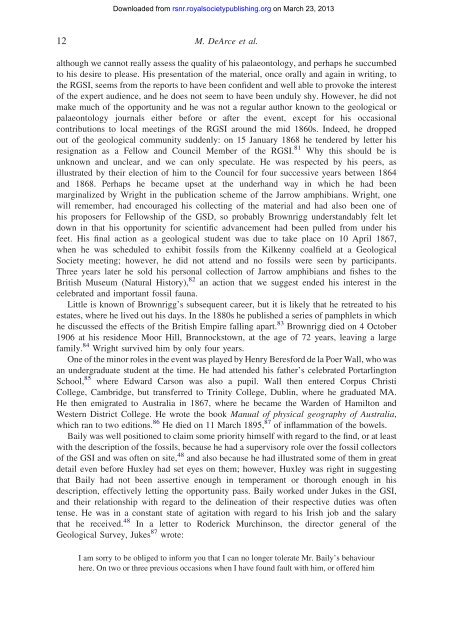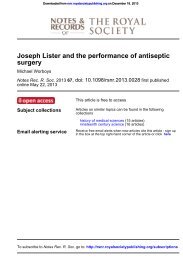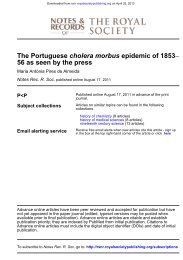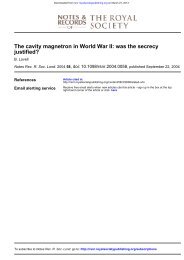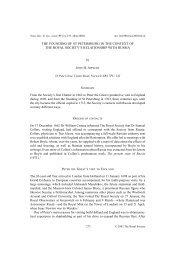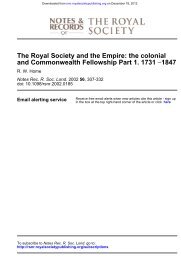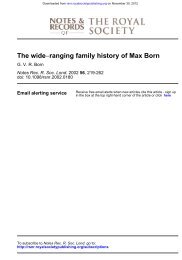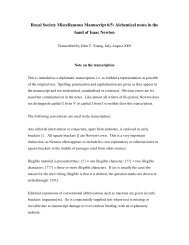Jarrow, Co. Kilkenny - Notes and Records of the Royal Society
Jarrow, Co. Kilkenny - Notes and Records of the Royal Society
Jarrow, Co. Kilkenny - Notes and Records of the Royal Society
Create successful ePaper yourself
Turn your PDF publications into a flip-book with our unique Google optimized e-Paper software.
12<br />
Downloaded from<br />
rsnr.royalsocietypublishing.org on March 23, 2013<br />
M. DeArce et al.<br />
although we cannot really assess <strong>the</strong> quality <strong>of</strong> his palaeontology, <strong>and</strong> perhaps he succumbed<br />
to his desire to please. His presentation <strong>of</strong> <strong>the</strong> material, once orally <strong>and</strong> again in writing, to<br />
<strong>the</strong> RGSI, seems from <strong>the</strong> reports to have been confident <strong>and</strong> well able to provoke <strong>the</strong> interest<br />
<strong>of</strong> <strong>the</strong> expert audience, <strong>and</strong> he does not seem to have been unduly shy. However, he did not<br />
make much <strong>of</strong> <strong>the</strong> opportunity <strong>and</strong> he was not a regular author known to <strong>the</strong> geological or<br />
palaeontology journals ei<strong>the</strong>r before or after <strong>the</strong> event, except for his occasional<br />
contributions to local meetings <strong>of</strong> <strong>the</strong> RGSI around <strong>the</strong> mid 1860s. Indeed, he dropped<br />
out <strong>of</strong> <strong>the</strong> geological community suddenly: on 15 January 1868 he tendered by letter his<br />
resignation as a Fellow <strong>and</strong> <strong>Co</strong>uncil Member <strong>of</strong> <strong>the</strong> RGSI. 81 Why this should be is<br />
unknown <strong>and</strong> unclear, <strong>and</strong> we can only speculate. He was respected by his peers, as<br />
illustrated by <strong>the</strong>ir election <strong>of</strong> him to <strong>the</strong> <strong>Co</strong>uncil for four successive years between 1864<br />
<strong>and</strong> 1868. Perhaps he became upset at <strong>the</strong> underh<strong>and</strong> way in which he had been<br />
marginalized by Wright in <strong>the</strong> publication scheme <strong>of</strong> <strong>the</strong> <strong>Jarrow</strong> amphibians. Wright, one<br />
will remember, had encouraged his collecting <strong>of</strong> <strong>the</strong> material <strong>and</strong> had also been one <strong>of</strong><br />
his proposers for Fellowship <strong>of</strong> <strong>the</strong> GSD, so probably Brownrigg underst<strong>and</strong>ably felt let<br />
down in that his opportunity for scientific advancement had been pulled from under his<br />
feet. His final action as a geological student was due to take place on 10 April 1867,<br />
when he was scheduled to exhibit fossils from <strong>the</strong> <strong>Kilkenny</strong> coalfield at a Geological<br />
<strong>Society</strong> meeting; however, he did not attend <strong>and</strong> no fossils were seen by participants.<br />
Three years later he sold his personal collection <strong>of</strong> <strong>Jarrow</strong> amphibians <strong>and</strong> fishes to <strong>the</strong><br />
British Museum (Natural History), 82 an action that we suggest ended his interest in <strong>the</strong><br />
celebrated <strong>and</strong> important fossil fauna.<br />
Little is known <strong>of</strong> Brownrigg’s subsequent career, but it is likely that he retreated to his<br />
estates, where he lived out his days. In <strong>the</strong> 1880s he published a series <strong>of</strong> pamphlets in which<br />
he discussed <strong>the</strong> effects <strong>of</strong> <strong>the</strong> British Empire falling apart. 83 Brownrigg died on 4 October<br />
1906 at his residence Moor Hill, Brannockstown, at <strong>the</strong> age <strong>of</strong> 72 years, leaving a large<br />
family. 84 Wright survived him by only four years.<br />
One <strong>of</strong> <strong>the</strong> minor roles in <strong>the</strong> event was played by Henry Beresford de la Poer Wall, who was<br />
an undergraduate student at <strong>the</strong> time. He had attended his fa<strong>the</strong>r’s celebrated Portarlington<br />
School, 85 where Edward Carson was also a pupil. Wall <strong>the</strong>n entered <strong>Co</strong>rpus Christi<br />
<strong>Co</strong>llege, Cambridge, but transferred to Trinity <strong>Co</strong>llege, Dublin, where he graduated MA.<br />
He <strong>the</strong>n emigrated to Australia in 1867, where he became <strong>the</strong> Warden <strong>of</strong> Hamilton <strong>and</strong><br />
Western District <strong>Co</strong>llege. He wrote <strong>the</strong> book Manual <strong>of</strong> physical geography <strong>of</strong> Australia,<br />
which ran to two editions. 86 He died on 11 March 1895, 87 <strong>of</strong> inflammation <strong>of</strong> <strong>the</strong> bowels.<br />
Baily was well positioned to claim some priority himself with regard to <strong>the</strong> find, or at least<br />
with <strong>the</strong> description <strong>of</strong> <strong>the</strong> fossils, because he had a supervisory role over <strong>the</strong> fossil collectors<br />
<strong>of</strong> <strong>the</strong> GSI <strong>and</strong> was <strong>of</strong>ten on site, 48 <strong>and</strong> also because he had illustrated some <strong>of</strong> <strong>the</strong>m in great<br />
detail even before Huxley had set eyes on <strong>the</strong>m; however, Huxley was right in suggesting<br />
that Baily had not been assertive enough in temperament or thorough enough in his<br />
description, effectively letting <strong>the</strong> opportunity pass. Baily worked under Jukes in <strong>the</strong> GSI,<br />
<strong>and</strong> <strong>the</strong>ir relationship with regard to <strong>the</strong> delineation <strong>of</strong> <strong>the</strong>ir respective duties was <strong>of</strong>ten<br />
tense. He was in a constant state <strong>of</strong> agitation with regard to his Irish job <strong>and</strong> <strong>the</strong> salary<br />
that he received. 48 In a letter to Roderick Murchinson, <strong>the</strong> director general <strong>of</strong> <strong>the</strong><br />
Geological Survey, Jukes 87 wrote:<br />
I am sorry to be obliged to inform you that I can no longer tolerate Mr. Baily’s behaviour<br />
here. On two or three previous occasions when I have found fault with him, or <strong>of</strong>fered him


